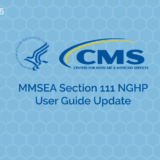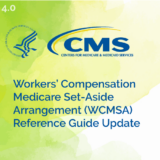1099-INT Forms for Medicare Set-Aside Accounts
January 8, 2024 by Sandy Simpson

It is getting close to that time of year when mailboxes begin to receive W-2 statements and 1099-INT statements. If an injured individual has either a Self-Administered Medicare Set-Aside (MSA) account or a Professionally-Administered MSA account, the individual will be sent a 1099-INT by January 31st and a copy will be filed with the IRS. The 1099-INT shows interest earned in the account during the previous tax year.
Liability and Workers Compensations cases should follow the Workers Compensation Medicare Set-Aside (WCMSA)Reference Guide, until CMS publishes a Liability Medicare Set-Aside (LMSA) Reference Guide. Until then, the WCMSA Reference Guide should be considered a single point of reference for Liability and Workers Compensation cases. To download the WCMSA Reference Guide Version 3.8, Dated November 14, 2022, click here.
What the WCMSA Reference Guide states:
-
MSA funds must be placed in an interest-bearing account that is separate from the individual’s personal savings and checking accounts.
-
The interest must be deposited into the MSA account to be used for MSA-covered expenses.
-
You can use the MSA account to pay for the income tax on the interest income.
For further clarification regarding how the individual can pay for the taxes from the interest incomed earned in their account, refer to the CMS Memo Dated July 11, 2005, Subject: Medicare Secondary Payer (MPS) – Workers’ Compensation (WC) Additional Frequency Asked Questions.
“Q6. Treatment of Taxable Interest Income Earned on a WCMSA – If I receive a Form 1099-INT for the interest income earned on my WCMSA account, may I charge the income tax on that amount against the WCMSA?
A6. Assuming that there is adequate documentation for the amount of incremental tax that the claimant must pay for the interest earned on this set-aside account, the claimant or his/her administrator may withdraw an amount equal to the additional tax as a “cost that is directly related to the account” to cover the additional tax liability. Such documentation should be submitted along with the annual accounting.”

How Medivest Handles the 1099-INT:
Medivest will advise the Member to prepare his/her tax return two ways to determine the increased income tax burden, if any:
-
Include the MSA interest income in the income tax return
-
Exclude the MSA interest income in the income tax return
In other words, if the Member must pay the IRS an increased income tax amount as a result of the interest earned from their MSA account, the additional income tax burden can be paid from the MSA account. This is considered a cost associated with having the MSA account and CMS allows this expense to be paid from the MSA account. Once a year, Medivest will send CMS an attestation for every applicable professionally-administered MSA account. Any MSA reimbursement of the additional income tax burden will be included in this attestation.
Answers to Common Questions
Question 1. If I am taxed on the earned interest, why can’t I have it?
Answer 1. CMS’ guidelines state that Medicare Set-Aside funds place must be placed into an interest-bearing account and are to be used for covered medical expenses.
Question 2. Why do I have to report the earned interest to the IRS?
Answer 2. Per IRS guidelines, all interest income is taxable, unless specifically excluded.
Question 3. Isn’t my injury settlement tax-exempt?
Answer 3. Any compensation you receive from a settlement because of physical injuries or sickness is not taxable. However, the interest earned after the settlement occurs is taxable.
Best Practices
Medivest’s highly trained representatives can help you figure out if Medicare may have an interest in your settlement. We assist all settling parties to navigate the MSP complexities and provide you with cost-saving strategies for your settlement. For questions about your account or setting up a new professional administration account please contact us here.





